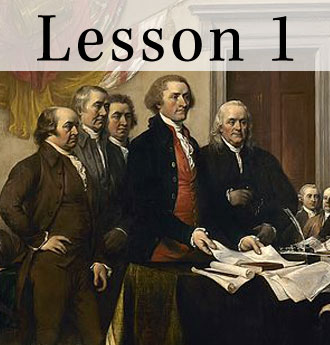Lesson 1: What Did the Founders Think about Constitutional Government?
What were the similarities and differences among the British colonies? (Video)
Similarities and differences among the British colonies, the charters that governed the colonies, and the effects of British policies on the colonies.
Student Questions: Unit 1, Lesson 1, Sections 1-3 (pdf download)
Where did the Founders get their ideas about government? (Video)
Influence of Greek and Roman thought; Plato, Aristotle, and Cicero; classical conception of human nature and political communities; impact of Enlightenment thought on human nature; period of "salutary" or "benign" neglect; and colonial experience in self-government.
How are political philosophy and practical experiences related to the notion of constitutional government? (Video)
Definitions of constitution and constitutional government, constitutions as a higher law, written and unwritten constitutions, and British concept of constitution.
We the People: the Citizen and the Constitution High School Hearing (Video)
After months of in-depth study, research, and preparation, We the People: The Citizen and the Constitution students display their knowledge of the U.S. Constitution and Bill of Rights in the program's culminating activity: a simulated congressional hearing. Students serve as expert witnesses on the country's founding principles and constitutional law and answer follow-up questions from a panel of judges. Watch this hearing from the We the People national finals in Washington, D.C., which draws the top classes from high school competitions in each state and the District of Columbia. The final day of competition, as shown in the video, is in congressional hearing rooms on Capitol Hill.
Overview of We the People: The Citizen and the Constitution (Video)
See how We the People: The Citizen and the Constitution can help young people become engaged and responsible citizens. Watch high school students explain their detailed knowledge of the Constitution and Bill of Rights during simulated congressional hearings at the We the People national finals.
Our Constitution: A Conversation (Video)
In this video, Supreme Court justices Sandra Day O'Connor and Stephen Breyer discuss the importance of the Constitution and explain several basic principles of American constitutionalism. They answer student questions about separation of powers, the Court's modern relevance, federalism, liberty versus security, notable cases, and decision-making in the Court, among other topics. The link takes you to Annenberg's Classroom website where visitors can watch the film in numerous languages. Filmed in 2005. Length: 29 min., 7 sec.
Unit 1 Overview: We the People: The Citizen & the Constitution Level 3 Text (Audio)
Scholars Margaret Branson, Sue Leeson, and Scott Casper present Unit 1 of the new We the People student text. Size: 2.4 mb. Length: 2 min, 35 sec.
60-Second Civics, Episode 79: A Problem of Constitutional Government (Audio)
The problem of constitutional governments.
60-Second Civics, Episode 78: Constitution As Higher Law (Audio)
How a constitution acts as a higher law.
60-Second Civics, Episode 77: Constitutionalism: Limited Government (Audio)
A comparison of limited and unlimited governments.
60-Second Civics, Episode 76: Constitutionalism: Written vs. Unwritten Constitu (Audio)
An examination of written and unwritten constitutions.
60-Second Civics, Episode 74: The Founders Choose Republican Government (Audio)
Why the Founders preferred republican government.
60-Second Civics, Episode 73: Republican Government (Audio)
A discussion of republican government.
60-Second Civics, Episode 72: Mixed Constitutions: The English System (Audio)
A discussion of the English system as an example of a mixed constitution.
60-Second Civics, Episode 71: Mixed Constitutions: Polybius and Cicero (Audio)
How the idea of a mixed constitution became part of republicanism.
60-Second Civics, Episode 70: Aristotle: Mixed Constitutions (Audio)
Aristotle's ideas about mixed constitutions.
60-Second Civics, Episode 69: Aristotle: Democracy (Audio)
Aristotle's description of democracy as a corrupt form of government.
60-Second Civics, Episode 68: Aristotle: Polity (Audio)
Aristotle's conception of polity as a right form of government.
60-Second Civics, Episode 67: Aristotle: The Forms of Government (Audio)
Aristotle's concept of the forms of government.
60-Second Civics, Episode 66: Aristotle: Three Functions of the State (Audio)
Aristotle's notion of the three functions of the state.
60-Second Civics, Episode 65: Two Lessons About Government (Audio)
Two important lessons the Founders learned about government from their study of history and philosophy.
60-Second Civics, Episode 64: Lessons From British and American History (Audio)
Lessons the Founders drew from British history and from American colonial history.
60-Second Civics, Episode 63: Greeks, Romans, and Natural Rights (Audio)
Lessons the Founders drew from Greek and Roman political history, and from natural rights philosophy.
60-Second Civics, Episode 62: Influences on the Founders (Audio)
How the Founders' knowledge and experiences informed their approach to governance.
60-Second Civics, Episode 61: Philosophical and Historical Traditions (Audio)
The beginning of a discussion of the important philosophical ideas and historical events that influenced the writing of the Constitution.






